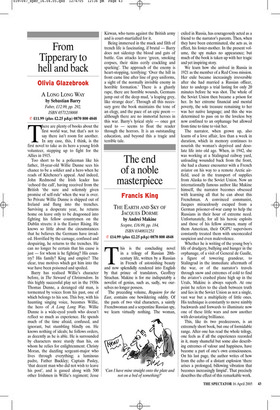From Tipperary to hell and back
Olivia Glazebrook
A LONG LONG WAY by Sebastian Barry Faber, £12.99, pp. 292, ISBN 0571218008 ✆ £11.99 (plus £2.25 p&p) 0870 800 4848 There are plenty of books about the first world war, but that’s not to say there isn’t room for another. In any case, this, I think, is the first novel to take as its hero a young Irish volunteer, stepping up to fight for the Allies in 1915.
Too short to be a policeman like his father, 18-year-old Willie Dunne sees his chance to be a soldier and a hero when he reads of Kitchener’s appeal. And indeed, John Redmond the Irish leader has ‘echoed the call’, having received from the British ‘the sure and solemnly given promise of self-rule’ when the war is over. So Private Willie Dunne is shipped out of Ireland and flung into the trenches. Surviving a desperate year, he returns home on leave only to be dragooned into fighting his fellow countrymen on the Dublin streets: it is the Easter Rising. He knows so little about the circumstances that he believes the Germans have invaded. Horrified by the carnage, confused and despairing, he returns to the trenches. He can no longer be certain that his cause is just — for whom is he fighting? His country? His family? King and empire? The clear, true motives which got him into the war have been poisoned and spoiled.
Barry has realised Willie’s character before, in The Steward of Christendom. In this highly successful play set in the 1930s Thomas Dunne, a deranged old man, is tormented by voices from his past, one of which belongs to his son. This boy, with his haunting singing voice, becomes Willie, the hero of A Long Long Way. Willie Dunne is a wide-eyed youth who doesn’t reflect so much as experience. He spends much of the time afraid, confused, and ignorant, but stumbling blindly on. He knows nothing of ideals; he follows orders, as decently as he is able. He is surrounded by characters more sturdy than his, on whom he relies for enlightenment: Christy Moran, the dazzling sergeant-major who lives through everything; a luminous padre, Father Buckley; Captain Pasley, ‘that decent man who did not wish to leave his post’, and is gassed along with 500 other Irishmen in Willie’s regiment; Jesse Kirwan, who turns against the British army and is court-martialled for it.
Being immersed in the muck and filth of trench life is fascinating, if brutal — Barry does not sidestep the blood and guts of battle. Gas attacks leave ‘green, smoking corpses, their skins eerily crackling and sparking’. The approach of the enemy is heart-stopping, terrifying: ‘Over the hill in front came line after line of grey uniforms, a sight of the normally invisible enemy in horrible formation.’ There is a ghastly rape, there are horrible wounds, Germans jump out of the deep mud, ‘a leaping grey, like strange deer’. Through all this necessary gore the book maintains the tone of an elegy, and the pace of an epic poem although there are no immortal heroes in this war. Barry’s lyrical style — once got used to — seems to float the reader through the horrors. It is an outstanding education, and beyond this a tragic and terrible tale.
























































 Previous page
Previous page